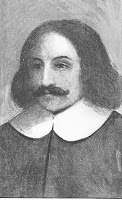ENG 48A
Journal #19 William Bradford
November 24, 2009
"Thus it pleased God to vanquish their enemies, and give them delivernce; and by His special providence so to dispose that not any one of them were either hurt, or hit, though their arrows came close by them, and on every side them, and sundry of their coats, which hung up in the barricado, were shot through and through. Afterwards they gave God solemn thanks and praise for their deliverance, and gathered up a bundle of their arrows, and sent them into England afterwards by the master of the ship, and called that place the 'First Encounter.'" (Bradford 119)
"The English in which it is written is that of the English Bible, or perhaps we should rather say the more popular language of the 'Pilgrim's Progress.' It is a language which Bradford uses with great effect." (G. Cuthbert Blaxland. "Mayflower" Essays on The Story of the Pilgrim Fathers. Ward & Downey Ltd., 1896)
Bradford records the encounter between the Puritan colonists and the Indians. Victory belonged to the colonists, and Bradford credited it to the workings of God. The protection of the Puritan colonnists from the arrows that the Indians fired was also said to be an act of God.
Blaxland categorized Bradford's language as that of the Bible, and in some ways, it is remarkably similar to the Old Testament. In the Book of Exodus, the Israelites, led by Moses to esca pe from the grip of the Pharaoh, underwent a similar journey to the promised land. The parallels are unmistakable; in Bradford's work, the theme of the Puritan colonists being on a divine journey could be observed. What is more interesting though is how Bradford fashioned the colonists. He included a reference of God in no less than nine occasions, and in each of the cases, God is said to be the direct cause of either the curse upon the enemies, or the success of the colonists themself. They saw themselves, in essence, as the Israelites, the chosen people. When mana rained from the Heavens, the Israelites rejoiced and knelt to thank God; similarly when Indian arrows spared the colonists, they took it as a form of God's protection.
pe from the grip of the Pharaoh, underwent a similar journey to the promised land. The parallels are unmistakable; in Bradford's work, the theme of the Puritan colonists being on a divine journey could be observed. What is more interesting though is how Bradford fashioned the colonists. He included a reference of God in no less than nine occasions, and in each of the cases, God is said to be the direct cause of either the curse upon the enemies, or the success of the colonists themself. They saw themselves, in essence, as the Israelites, the chosen people. When mana rained from the Heavens, the Israelites rejoiced and knelt to thank God; similarly when Indian arrows spared the colonists, they took it as a form of God's protection.
 pe from the grip of the Pharaoh, underwent a similar journey to the promised land. The parallels are unmistakable; in Bradford's work, the theme of the Puritan colonists being on a divine journey could be observed. What is more interesting though is how Bradford fashioned the colonists. He included a reference of God in no less than nine occasions, and in each of the cases, God is said to be the direct cause of either the curse upon the enemies, or the success of the colonists themself. They saw themselves, in essence, as the Israelites, the chosen people. When mana rained from the Heavens, the Israelites rejoiced and knelt to thank God; similarly when Indian arrows spared the colonists, they took it as a form of God's protection.
pe from the grip of the Pharaoh, underwent a similar journey to the promised land. The parallels are unmistakable; in Bradford's work, the theme of the Puritan colonists being on a divine journey could be observed. What is more interesting though is how Bradford fashioned the colonists. He included a reference of God in no less than nine occasions, and in each of the cases, God is said to be the direct cause of either the curse upon the enemies, or the success of the colonists themself. They saw themselves, in essence, as the Israelites, the chosen people. When mana rained from the Heavens, the Israelites rejoiced and knelt to thank God; similarly when Indian arrows spared the colonists, they took it as a form of God's protection.However, the Puritan colonists, in my opinion, displayed the unfavorable traits of so many other groups of people before them who believed God was on their side and that they were chosen. The British, for instance, did the same thing with Indians as the Puritan colonists did with the Native Indians. Their religious fervor immediately led them to view other races as inferior and in need of enlightenment. Such mindset and mentality eventually sowed the seeds of slavery. The colonists adherence to the Old Testament blinded them in the virtues and qualities prescribed by Christianity. "Love thy neighbor"; "Do unto others as you would have them do unto you." The Bible could be interpreted in a great many different ways; it appeared that the Puritan colonists had their own separate interpretation.




















